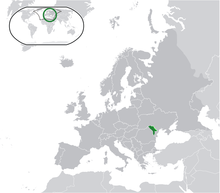
Back معاملة المثليين في مولدوفا Arabic LGBT práva v Moldavsku Czech Homosexualität in der Republik Moldau German Rajtoj de GLAT en Moldavio Esperanto Diversidad sexual en Moldavia Spanish LGBT õigused Moldovas Estonian זכויות להט"ב במולדובה HE Hak LGBT di Moldova ID Diritti LGBT in Moldavia Italian Sytuacja prawna i społeczna osób LGBT w Mołdawii Polish
LGBT rights in Moldova | |
|---|---|
 Location of Moldova (green) – Transnistria (light green) on the European continent (green + dark grey) | |
| Status | Yes, legal since 1995 |
| Gender identity | Yes, right to change legal gender (with psychiatric diagnosis) |
| Military | Gays, lesbians and bisexuals allowed to serve |
| Discrimination protections | Sexual orientation and gender identity protection (see below) |
| Family rights | |
| Recognition of relationships | No recognition of same-sex relationships |
| Restrictions | Same-sex marriage constitutionally banned |
| Adoption | No |
Lesbian, gay, bisexual, and transgender (LGBT) people in Moldova face legal and social challenges and discrimination not experienced by non-LGBT residents. Households headed by same-sex couples are not eligible for the same rights and benefits as households headed by opposite-sex couples. Same-sex unions are not recognized in the country, so consequently same-sex couples have little to no legal protection. Nevertheless, Moldova bans discrimination based on sexual orientation in the workplace, and same-sex sexual activity has been legal since 1995.
Since the Dissolution of the Soviet Union, Moldova has come increasingly under the influence of the Orthodox Christian Church. As result, it has been marred by human rights violations, including violations of freedom of association and freedom of speech.[1][2] Moldova's first pride parade was held in 2002. Since then, however, pride parades have encountered stiff opposition from authorities and religious leaders, and have often been cancelled or banned due to safety concerns. A successful pride parade took place in May 2018 in Chișinău, after police officials protected the participants from violent radical Orthodox groups.
Moldovan society remains very problematic in that regard, as discrimination and violence against members of the LGBT community are commonplace. In 2012, ILGA-Europe ranked Moldova last in a list of 49 European countries with regards to LGBT legislation. By 2023 Moldova had climbed to the 23rd place, its rise in ranking due to continued expansion of anti-discrimination laws with regards to sexual orientation and gender identity.[3][4]
- ^ Intergroup reminds Moldova that Right to Freedom of Assembly is a prerequisite to EU accession Archived 27 September 2007 at the Wayback Machine, ILGA Europe
- ^ Moldova: Country Reports on Human Rights Practices – 2006, U.S. Department of State
- ^ Cite error: The named reference
atlanticwas invoked but never defined (see the help page). - ^ Cite error: The named reference
rainbowwas invoked but never defined (see the help page).